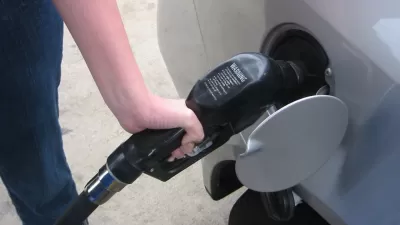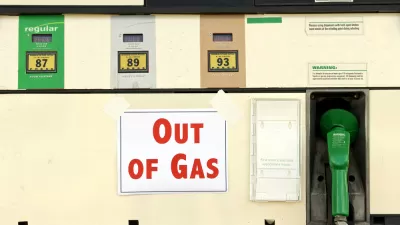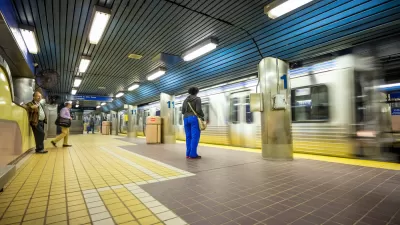In a dramatic 24-hour turnaround, the House voted to support Gov. Tom Corbett's proposal to lift the cap on the state's oil franchise tax that could potentially add 28 cents to gas prices. A prevailing wage issue caused the bill's defeat earlier.

"Transportation Secretary Barry Schoch said he and other Corbett officials worked through the day to persuade some lawmakers to support the legislation," writes Amy Worden about the $2.3 billion transportation bill that had been rejected on a 98-103 vote on Monday.
"The proposal would increase motorists' fees - for drivers' licenses, registration, and moving violations - starting in 2015 and lift the decades-old cap on the oil franchise tax, which some say could mean an increase of as much as 28 cents per gallon at the pump based on wholesale prices in 2013," Worden writes.
The proposal - one of Gov. Corbett's top agenda initiatives - would increase gas taxes and motor vehicle license fees to raise $1.65 billion needed to repair aging bridges and roads and about $475 million for cash-strapped mass-transit systems.
The vote "blurred party lines" due to a provision affecting prevailing or union-scale wages on transportation projects. The bill would exempt lower cost transportation projects from the higher wage requirement.
Politico's Emily Schultheis, writing a day earlier about Monday's rejection of the bill, describes the non-partisan nature that transportation bills have the potential to take in state legislatures.
Transportation issues bring members of both parties together in a way few other issues do — and generally earn high marks from voters, who expect state government to fix their roads and improve their public transit. It’s an especially big deal in the crucial southeastern region of the state, where the need for transportation funding is dire.
Along those lines, Worden writes, "Most of the Philadelphia delegation - and many suburban Republicans and Democrats - supported the bill because of its dedicated transit funding. SEPTA officials applauded the vote, which would avert the adoption of the "doomsday budget" that could mean rail-line closures."
The bill now goes to the Senate which had passed a similar transportation funding bill last June as we previously posted here.
If the bill were to become law, Pennsylvania could have the highest gas tax after the tax cap was fully lifted, according to this chart (PDF) prepared earlier this year, warned the tax group, Citizens Alliance of Pennsylvania.
Corbett, a Republican, is up for reelection next year. This bill is among his highest priorities. His Facebook page praised the House for passing the bill.
UPDATE (11/21/2013): On a 43-7 vote, the Pennsylvania Senate passed the House transportation funding bill on Wednesday. It now returns to the House for a last ratification, anticipated today, "after which the bill is expected to be signed into law by Gov. Tom Corbett," writes Charles Thompson of The Patriot News.
FULL STORY: Pa. House OKs transportation bill it rejected a day earlier

Alabama: Trump Terminates Settlements for Black Communities Harmed By Raw Sewage
Trump deemed the landmark civil rights agreement “illegal DEI and environmental justice policy.”

Study: Maui’s Plan to Convert Vacation Rentals to Long-Term Housing Could Cause Nearly $1 Billion Economic Loss
The plan would reduce visitor accommodation by 25% resulting in 1,900 jobs lost.

Why Should We Subsidize Public Transportation?
Many public transit agencies face financial stress due to rising costs, declining fare revenue, and declining subsidies. Transit advocates must provide a strong business case for increasing public transit funding.

Paris Bike Boom Leads to Steep Drop in Air Pollution
The French city’s air quality has improved dramatically in the past 20 years, coinciding with a growth in cycling.

Why Housing Costs More to Build in California Than in Texas
Hard costs like labor and materials combined with ‘soft’ costs such as permitting make building in the San Francisco Bay Area almost three times as costly as in Texas cities.

San Diego County Sees a Rise in Urban Coyotes
San Diego County experiences a rise in urban coyotes, as sightings become prevalent throughout its urban neighbourhoods and surrounding areas.
Urban Design for Planners 1: Software Tools
This six-course series explores essential urban design concepts using open source software and equips planners with the tools they need to participate fully in the urban design process.
Planning for Universal Design
Learn the tools for implementing Universal Design in planning regulations.
Smith Gee Studio
Alamo Area Metropolitan Planning Organization
City of Santa Clarita
Institute for Housing and Urban Development Studies (IHS)
City of Grandview
Harvard GSD Executive Education
Toledo-Lucas County Plan Commissions
Salt Lake City
NYU Wagner Graduate School of Public Service




























